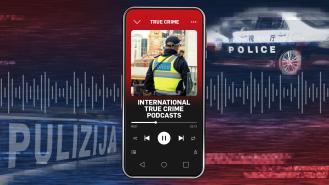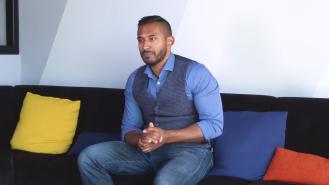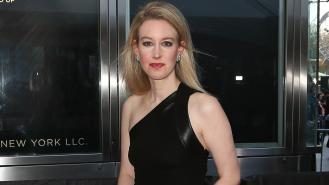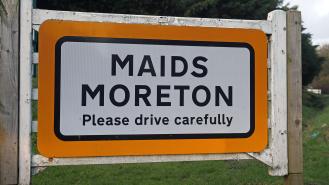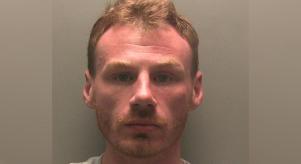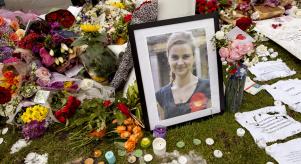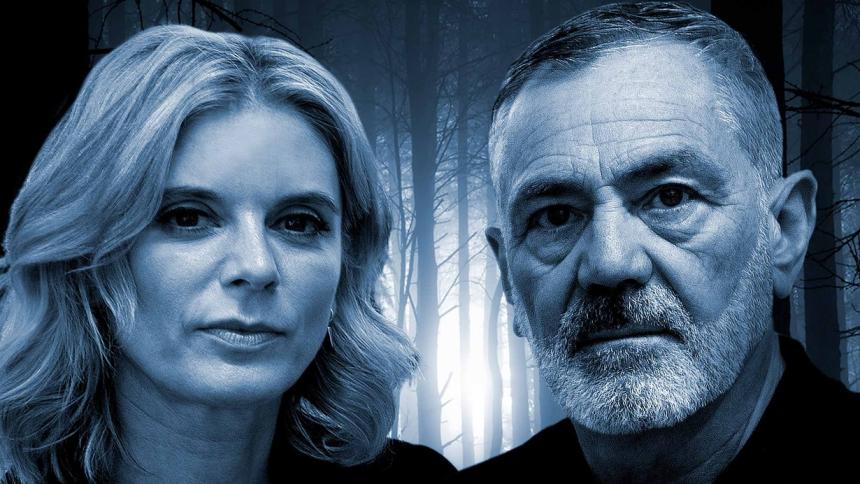
Interview with David Wilson co-host of podcast 'If It Bleeds It Leads'
If It Bleeds It Leads is a brand new podcast exploring the world of true crime, hosted by the UK’s leading criminologist, Professor David Wilson, and star of Silent Witness, Emilia Fox.
Each week David and Emilia will tackle the topical true crimes stories dominating headlines as well as deep dives into true crime focused entertainment.
Crime+Investigation spoke to David over Zoom to discuss the podcast series, his career as a criminologist and his latest book, A Plot To Kill, a story of deception, betrayal and murder in a quiet English town.
Crime+Investigation: How would you describe the premise of the show?
Professor David Wilson: 'If it bleeds, it leads' is an old newsroom adage that implies that violent crimes tend to lead the news agenda. But to what extent does that news agenda, and the news portrayal of crime fit the reality?
Your co-host in the series is actress Emilia Fox. What was it like working with her?
For Emilia, and me, our worlds in some senses crossover. Emilia is famous for playing Dr Nikki Alexander, a forensic pathologist in Silent Witness, and therefore she deals with the portrayal of crime and my life is about that reality. For the series, I open my contact’s book and get all these people to come in and talk about their work and she opens her’s and gets actors or producers, or directors to talk about their work in this portrayal of crime.
What do you enjoy most about taking part in the series?
Working with Mils. She is my friend and so we've known each other for a wee while? And so it's great fun to be able to hang out with her and just talk about what we're going to be doing in the podcast.
I've enjoyed speaking to people from her world and I think if she was being interviewed now, she would say, she would enjoy speaking to people from my world.
What do you hope listeners will get from it?
What I hope what they get from it is a bit more of the reality of crime and punishment, and how that reality is, or might not be portrayed in the media.
People who are interested in true crime are really trying to solve mysteries. So, what they’ll get from the podcast are the tools and techniques that they might have never heard about to go about solving them.
In episode 1 you interview bank robber Neil 'Razor' Smith. What was it like speaking to him?
I know Noel well. He was one of Britain's most prolific bank robbers who turned his life around in one of the prisons I worked in. He was in therapy for 5 years.
In that particular episode and I wanted listeners to be taken to the very heart of what it was like being in a car about to commit a bank robbery. because it’s not just about the money. It's a psychological rush that you get, like an addiction. That addiction is about feeling powerful and in control, at that moment, in ways that you're not powerful and in control and other aspects of your life.
Which other interviews in the series, stand out for you and why?
From my world, I liked talking to Professor Simon Winslow, who is a criminologist, who studies men's violence and masculinity. I think Simon's backstory is so interesting because he was a bouncer before he became an academic. All of his field research was being a doorman in the pubs and clubs in the Northeast of England. He discusses masculinity and whether there is such a thing as a warrior gene.
I also liked talking to Jane Monckton Smith, again from my world who has recently been talking about coercive control and domestic violence and has produced a wonderful book recently about that subject area.
From Mils' world, I enjoyed talking to Mark Bonner, partly because he's Scottish like me, but also because he was in a TV series called Shetland which I liked watching. He was also in Line of Duty and Unforgotten, which was a drama based about historic cold cases.
You’re a professor of criminology. Can you explain what criminology is?
Criminology is what sometimes called a rendezvous discipline so it takes its methods from psychology, anthropology, history and law and sociology. Criminology is interested in trying to understand crime, and what we can do to reduce the amount of crime by beginning to appreciate why crime occurs. So, it's a scientific study of crime and the people who commit crimes. But criminology is something that has its academic roots in different subject areas.
Who is the scariest person you’ve met in your career and why?
People always think that I'm going to say somebody like a serial murderer like Dennis Nilsen who I did a lot of work with but they never scared me. The people that scared me, both when I was working in prisons or indeed the work that I do now are those people I can’t read quickly.
I'm often in situations where it's potentially violent, and I have to be able to assess very quickly if I'm at any threat,
I'm a very good reader of body language, of what people are saying, how they're conducting themselves, their willingness to make eye contact. There’s a whole range of things that allow me to read a person. But the scariest people are those who I just can't read, and they can move from zero to 100 miles an hour, with no intervening stage.
Are there some people who are just too dangerous to be released and rehabilitated, like Charles Bronson?
Charles Bronson doesn't want to be released. What Charles Bronson wants is to be famous, and he's got more opportunity to be famous in prison than he would ever have if he was in the community. He's not at all what the public thinks he is.
Is there a risk that prisoners can become too institutionalised?
You never want to institutionalise people, because we don't live in an institution we live in society and except for some 60/70, prisoners who are serving whole-life tariffs, everybody at some stage is going to be released back into the community.
I've never been a prison abolitionist, I've always believed that there is a role for prison in our culture, because there are some people that you can’t release. For some, prison will be an appropriate place for them to be sent to, and it will be an appropriate place for a small number, spend the rest of their lives in. But you never want the vast majority of prisoners to become institutionalised. Therefore, you give them access to education, training, work skills, so that they're better equipped, when they come out of prison, to be able to make a positive contribution to society.
Having dealt with them in your career, what’s the big difference between a normal person and a serial killer?
I've yet to encounter a serial killer who didn't have underlying psychopathy: they were functioning psychopaths. The vast majority of people are not psychopaths.
It changes all the time but I think the current statistics say that one out of every 100 People will be psychopathic. Serial killers are often prompted by sexual fantasy, and their need to feel powerful, to fulfil those sexual fantasies. We all have sexual fantasies, but we don't need to kill, to achieve them.
You’ve recently published a new book, A Plot to Kill, about Ben Fields who was branded a psychopath by detectives in the Peter Farquar murder. Can you tell us about the book?
One of those facets of psychopathy would be the desire to live life in the fast lane, to enjoy the finer things in life but Ben Field wasn't like that. He was ultimately going to inherit money when Peter Farquar died but his motivation wasn't monetary There didn't seem to me, the kinds of behaviours that I would have expected. So, there was clearly a lot more going on.
One of the things that I think has been under-emphasised in that case, is that I think he was a gerontophile. I think that he genuinely was sexually attracted to older people. There has been a tendency to believe it must have been Peter Farquhar that came on to the younger man. But, I get a sense of having studied the case, there was just as much of Field, coming on to Peter Farquhar. That part of his personality was very psychopathic.
A lot of what he was seeking to do was really just embed himself in the community. I use the phrase in the book, he like was a less talented, Tom Ripley from Patricia Highsmith’s The Talented Mr Ripley.
I think that the other thing unexpressed about this crime is that Peter Farquhar self-published three novels. I must have been the first person to read all three novels, and it is quite clear that the plot in the third of the novels is replicated by Fields in reality. And that's why it is called A Plot To Kill.
Check out our true crime podcast hub for podcast features and interviews, plus full episodes of the Murdertown podcast.
